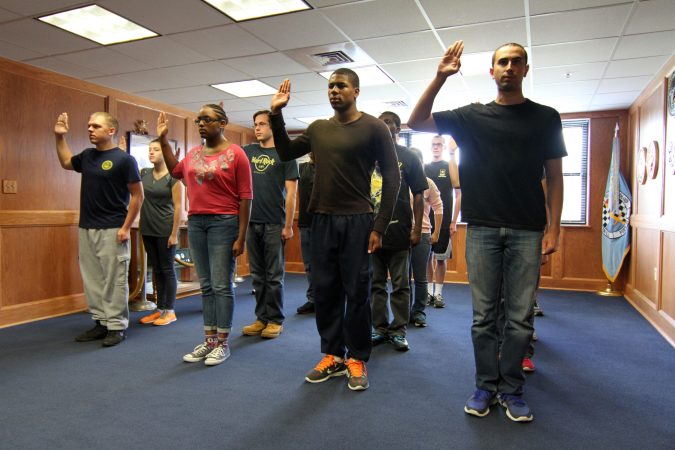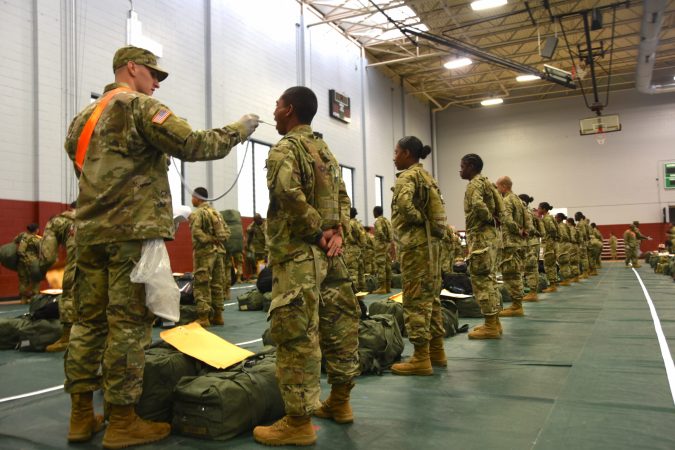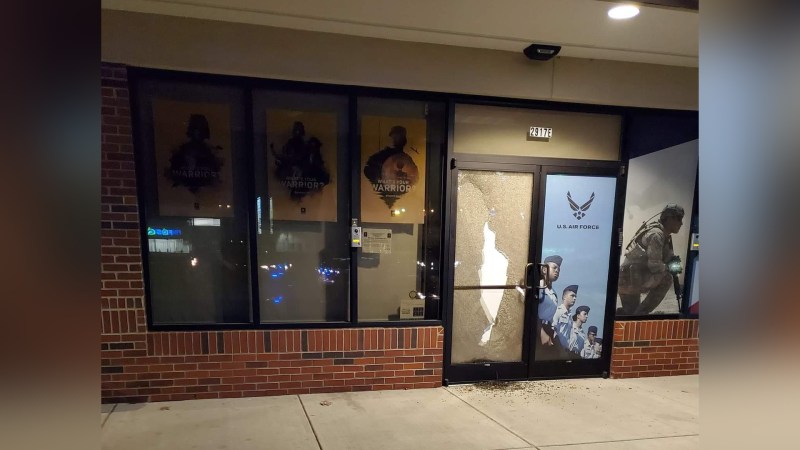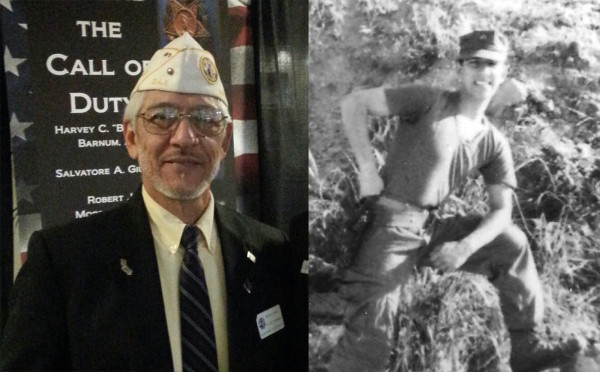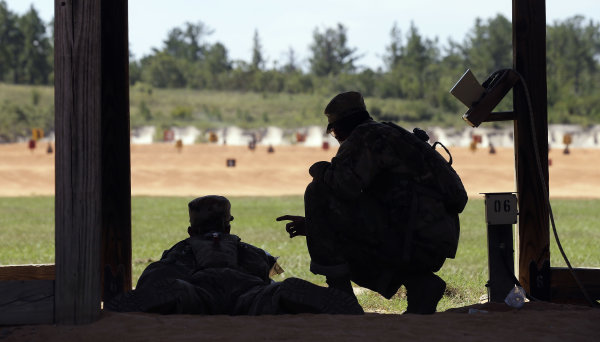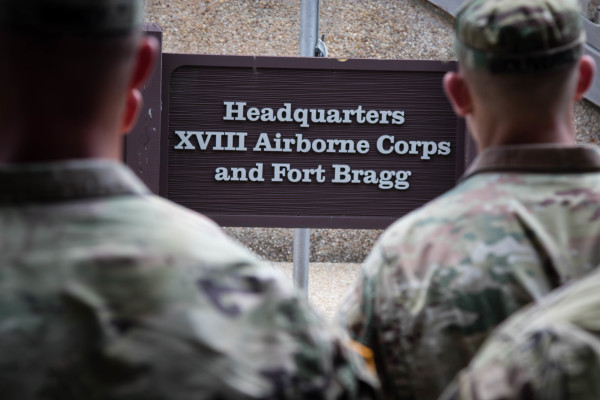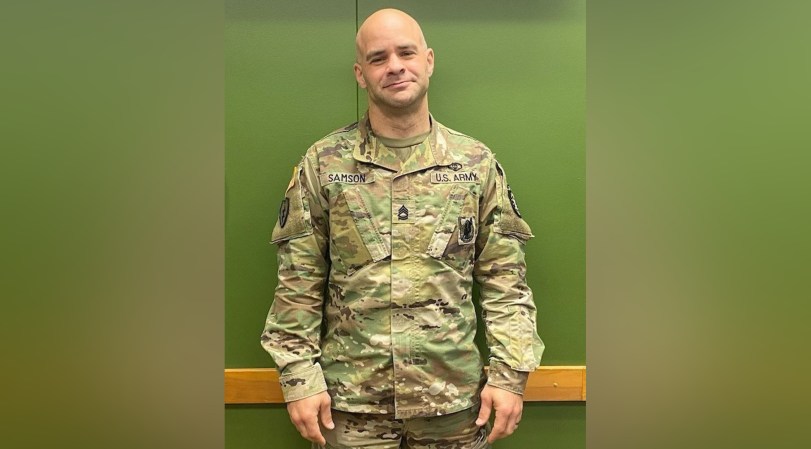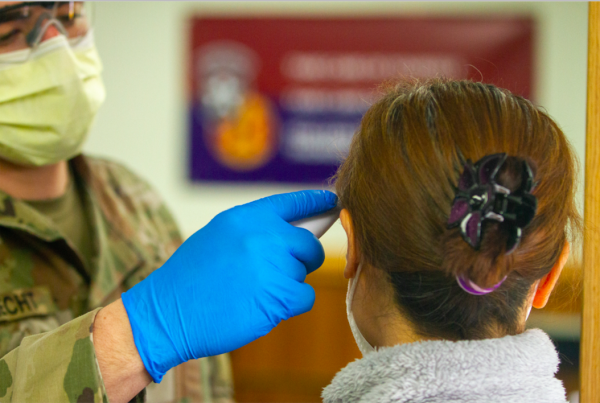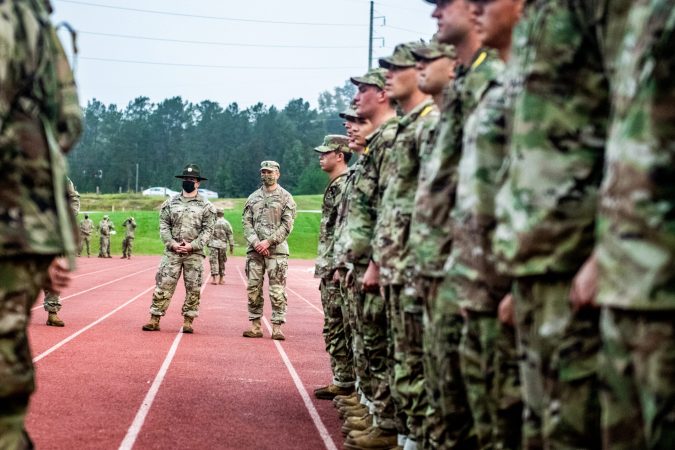As the Army struggles to get young people in uniform, the very people charged with doing that say one of their biggest challenges is coming from the Defense Department itself.
This year, the Pentagon officially launched Military Health System (MHS) Genesis, a new electronic health record system for the military that is the result of years of pilot programs, testing, and congressional mandates. Col. Megan Stallings, commander of U.S. Military Entrance Processing Command (USMEPCOM), called it a “leap in medical modernization” that is “revolutionizing our medical processing.” It was introduced not only at Military Entrance Processing Stations (MEPS), but across the military health system to streamline care for service members, dependents, and veterans.
The idea was that with MHS Genesis, MEPS would be able to see all of a new recruit’s health records in one place — every broken bone and prescribed medication — to help quicken the process. It was meant to make things easier. But as is sometimes the case with processes and systems in the military meant to help, it didn’t.
Three recruiters in different states who spoke to Task & Purpose on condition of anonymity as they are still serving and were not authorized to speak to the media, said that while they don’t blame Genesis for all of their recruiting woes, the program certainly hasn’t helped.

They described an unpredictable process for recruits that last weeks — sometimes months — longer than it did before Genesis came online. The system has resulted in furious parents who are often the ones setting up doctor’s appointments for additional tests and paperwork, they said, and it has discouraged recruits who change their minds in the time it takes the Army to work through their records.
Meanwhile, recruiters are still receiving pressure to meet goals that at times seem unrealistic, given the delay Genesis poses. Recruiters who spoke to Task & Purpose also said the military isn’t up-to-date on the very generation they’re trying to put in uniform. They understand why screening is important and certain histories or conditions should be disqualifying for service, but they said things like anti-depressants and medication for attention-deficit/hyperactivity disorder (ADHD) are increasingly common among young people while posing huge hurdles for joining the military.
Subscribe to Task & Purpose Today. Get the latest military news, entertainment, and gear in your inbox daily.
The timing of challenges with MHS Genesis couldn’t be worse. The Army — along with the rest of the military — is in the midst of the biggest recruiting crisis in decades. Low levels of trust in the military, combined with a decline in the percentage of young people who are even eligible to serve and low unemployment rates, have made recruiting even more difficult. Lt. Col. Randee Farrel, spokeswoman for Secretary of the Army Christine Wormuth, said on Thursday that the service anticipates being 15,000 recruits short of their goal this fiscal year, and Army senior leaders said in July they could be short more than 25,000 soldiers at the end of fiscal year 2023.

However, Army officials said none of that is because of MHS Genesis. Maj. Andrew Harshbarger, spokesman for the Army’s Training and Doctrine Command, said the transition to MHS Genesis will “be a positive for our newest soldiers” by ensuring the “highest levels of safe, informed care.” He said while TRADOC recognizes that concerns with medical screening exist, “we have taken both near and long term actions to mitigate those concerns.”
“These actions range from the continued review of our processes to optimize medical screening requirements, to the placement of additional administrative and medical personnel at critical locations to facilitate medical processing requirements,” Harshbarger said. “All these actions are designed to reduce the time needed to complete a successful enlistment into the United States Army.”
Brian McGovern, a spokesman for U.S. Army Recruiting Command, said there is “no evidence” that MHS Genesis is “contributing to the Army’s current shortcomings in recruitment.” And Marshall Smith, the spokesperson for U.S. Military Entrance Processing Command, told Task & Purpose that while the system “has increased medical disqualifications,” it’s because “it is a better tool to review an applicant’s medical history and better ensure they meet the qualifications for military service.”
Recruiters, however, didn’t agree that the tool was better. In fact, one senior recruiter in Missouri said the system was worse than what the process was before and has done the opposite of what it was intended to do.
“What we’re seeing more and more … is the doctors are requesting and requesting and requesting information based on what they’re seeing on these files, these electronic medical records,” the senior recruiter said. “So we’re doing the same thing that we were supposed to be avoiding: We’re still running out and getting medical records and medical records and medical records, just to provide to the doctor so the doctor will let him come up and do a physical, and make a determination on their fitness to serve … It’s way worse than it ever was before.”

‘Please don’t lie to me’
Before MHS Genesis came online, there was MROAD — Medical Review of Authoritative Data — which allowed officials at MEPS to see a recruit’s prescription history.
It was a pilot of sorts for Genesis, and would flag everything from allergy medications to birth control, epi pens, and inhalers. The latter three of those prescriptions would trigger a flag for officials at MEPS who would then ask for medical records for those medications.
“It was causing a ton of issues when it first came out,” the senior recruiter said, “because the pharmacy history only shows a small piece of the overall picture.”
Recruits would be flagged if MEPS saw something like oxycodone in their files, even if it was for something simple like getting wisdom teeth removed. So recruiters were then “spending so much time at hospitals” trying to get paperwork for their recruit, only to finally send it up to the doctor at MEPS and be told it wasn’t sufficient.
“Then you’d have to go back to the hospital, back to waiting 3-5 weeks,” the senior recruiter said. “Recruiters were going nuts.”

When MROAD was discontinued, the senior recruiter said everyone “rejoiced.” But the celebration was short-lived, when roughly a month later, MHS Genesis came online.
The recruiter said they were told it would save “so much time” because instead of them having to go hunt down medical records themselves, the doctors at MEPS would be able to pull it directly. But that’s “not what happened at all.” The result has been doctors who ask for more medical records on seemingly every condition under the sun, prolonging the recruitment process and oftentimes placing the burden for those additional tests and consultations on parents and recruits.
The frustrations expressed by recruiters who spoke to Task & Purpose were also mirrored online — and not just from the Army. On an unofficial Navy SEAL Reddit page, one person acknowledged that the new system “sucks for all of [you] new guys. Used to be that you would just plead the 5th or lie through your teeth.” Another person said on a Navy Reddit thread that the new system at MEPS is “an absolute train wreck” and “incredibly frustrating.” On a Reddit page for Air Force recruits, someone asked why MEPS would be asking for additional records if they were supposed to be able to see everything with MHS Genesis.
“Typically, they cannot see entire records,” one Reddit user responded. “It’s supposed to work that way, but we are seeing a pretty major disappointment with this system.”
When asked on the unofficial Army Reddit if Genesis was “really that bad,” one person responded, “Hell yeah it is!” A second person said: “It’s worse.” Another commented that the system has “stalled the process for a ton of people.”

“Recruiting in my area used to be 36 days from meeting someone to them joining; it’s now at hanging around 224 days, sure some outliers have shifted that number to the right, but ultimately those outliers have always joined, it’s now just no one joins quickly,” the Reddit user wrote.
And despite knowing that MHS Genesis was coming, recruiters all said there was a shortage of doctors and personnel, which is also contributing to exacerbated timelines because there aren’t enough people working on pushing paperwork through.
Those challenges were acknowledged from the very top. In June, Gen. Paul Funk, then the commander of Army Training and Doctrine Command (TRADOC), told Secretary Christine Wormuth that the “under-resourced roll out” of MHS Genesis “generated significant processing backlogs,” according to Army Times.
“[Army Recruiting Command] does not have sufficient physician waiver assistants on staff to mitigate the shortfall,” Funk wrote, according to Army Times. “TRADOC internally tasked medical providers to assist in the short term, but cannot sustain without structure change.”
Indeed, Command Sgt. Maj. Daniel Hendrex, the TRADOC command sergeant major, told Army Times that the command had to move over 90 medical personnel to U.S. Army Recruiting Command to keep up with the demand from MHS Genesis. Yet it doesn’t seem to be enough.

“Almost every MEPS across the country is understaffed,” said a recruiting company commander who spoke on condition of anonymity. “Even though the DoD knew this was coming, they didn’t forecast the additional amount of civilians they would need.”
Marshall Smith, spokesman for U.S. Military Entrance Processing Command, said the majority of MEPS staffing “is within normal ranges.” Maj. Harshbarger with TRADOC said that the Army averages between 3,000 to 3,500 recruits in the medical screening pipeline, though those numbers have been reduced after actions the Army took, including adding more personnel at MEPS locations.
Recruiters also pointed to an inconsistent process in how doctors view each medical condition or prescription. A recruiting noncommissioned officer in the northeast said it’s nearly impossible to anticipate what each soldier will need to help the process go smoother. Someone could come in with one condition and be required to provide three different kinds of paperwork, but then another soldier with the exact same condition will be asked for seven different kinds of paperwork, he said.
“Even if it’s the same injury or same symptom, it’s always they want something different, they want more, this isn’t right,” the NCO said.
And sometimes, those consultations are being paid for by the recruit or their parents. The NCO said they may have the option of waiting for a consult paid for by the Army, but typically the recruit just wants to “get it done, so they pay it out of their own pocket.” Not to mention the time commitment. The same recruiter said one recruit had to drive over two hours to the nearest MEPS three times to deliver more paperwork and meet with the doctors, which forced him to take time off of work.

The stringent regulations also say a lot about what the military doesn’t understand about the new generation it’s recruiting, the NCO said. Members of Generation Z — those born between 1997 – 2012 — are more likely to report depression and anxiety than older generations, according to the American Psychological Association, primarily due to national issues and world events. The COVID-19 pandemic has also hit young people hard; more than 70% of Gen Z reported symptoms of depression during the pandemic.
The NCO said medication for depression, as well as attention-deficit/hyperactivity disorder (ADHD) is “very common” for people ages 17 to 24 years old today. Nevertheless, it’s still an issue for the military. An article published by the Army University Press in February says almost half of all waivers submitted for ADHD are denied.
“I don’t think the Department of Defense researched today’s generation,” the NCO said. Army officials have said the Defense Department is looking at pilot programs to shorten the timeline for review for conditions like ADHD.
But that kind of mandatory transparency is a totally different way of doing things than military recruiters have in the past. It’s common knowledge that for decades, recruiters and recruits alike have omitted certain details about a recruit’s medical history in order to get them through the door. It’s so prevalent, in fact, that the recruiting NCO said he has to emphasize that no matter what they’ve heard, they need to tell him the truth.
“A lot of them will Google or Reddit like ‘What to tell your recruiter,’ and they come to us and they still lie,” the NCO said. “We have to explain to them and stress to them, ‘Please don’t lie to me because they’re going to pull your records. They’re going to catch this stuff.’”

Kate Kuzminski, director of the Military, Veterans and Society Program at the Center for a New American Security, said the military is holding the new generation of soldiers to standards that today’s military leaders likely weren’t held to when they joined. Because of advancing technology and how medical screening has changed over the years, some leaders may not have even been cleared to join if they attempted to today, particularly when it comes to mental health.
“It’s not necessarily that the presence of ADHD or ADD is increasing,” Kuzminski said, “it’s that we actually collect that medical information on a generation of kids that we didn’t collect previously. … I think there’s probably a lot of people over the course of American history who, even with something like ADHD, do very well in a structured environment where they’re given clear expectations and they’re part of a group. It could have easily gone undiagnosed for generations, it’s just that we as a society and the medical community are paying more attention to that now than we did even 30 years ago.”
And because of the way MHS Genesis will see everything from a recruit’s medical history, there’s no room for people to hide past prescriptions or diagnoses, even if it was temporary or something they’ve grown out of. The senior recruiter spoke of a young woman he was helping enlist, who’d been in a car accident two years ago and was briefly prescribed anti-anxiety medication because she had nightmares as a result of the crash. She took the medication only for three months, the recruiter said, but it still falls outside the regulation that says new recruits must be medication-free for three years before enlisting.
“A few years ago, I probably would have said, ‘Hey if you were only on these meds for a couple months, and you haven’t been on them for a while, we’re just going to roll with that.’ But we don’t have that latitude anymore,” he said. “And the doctor is going strictly by the regulation of what they can and cannot approve.”
That could even end up furthering the stigma around mental health care, the senior recruiter said.

“If you’re a young man or young woman and your entire purpose is to serve someday,” he said, “you absolutely will be like, ‘Oh I can’t see a doctor or they’re going to sideline me for mental health and I’m not going to be able to join.’ … We’re just pushing that all the way to the very front end and saying hey, if you get treated for this it’s going to affect you joining the military.”
‘These parents are kind of exasperated’
When it comes to recruiting, the military’s messaging is often for parents, coaches, and guidance counselors as much as it is for the potential recruits themselves. As important as it is to get young people interested, it’s just as important to have adults in their life on board with their decision to join.
But recruiters who spoke to Task & Purpose said parents have become incredibly frustrated with MHS Genesis and what it’s demanding of both them and their children.
The NCO said one recruit’s parents, who also served in the military, were “extremely angry with us” after being asked again and again to provide more medical records. “It was a lot of smoothing that over,” he said. “They’re like, ‘I joined 23 years ago, I didn’t have to do all this nonsense!’ And we have to explain the process and all the changes.”

The senior recruiter said the new system is damaging trust between parents and the Army. For some, allowing their son or daughter to sit down with a recruiter is already “a big step as a parent,” but then their child comes home and tells them how many more medical records they need to provide than they thought.
“These parents are kind of exasperated by it, like, ‘I’ve already gotten everything I’ve expected, that they requested, why are they requesting more?’” the senior recruiter said. “And so now you’re ticking off the parent, which is the person you really want on your side.”
The prolonged timelines also fly in the face of what can be a benefit in joining the Army. Depending on their home lives or financial situations, recruits may be eager to ship out as quickly as possible. The Army even offers quick-ship bonuses to get people to basic training within weeks. But with MHS Genesis, that timeline has sometimes gone from a couple of weeks to a month, or longer.
“They used to always say, ‘Two weeks contact to contract.’ From the time you meet somebody to the time that they enlist needs to be about two weeks. Well now, we’re looking at a 30 to 90 day rule, so the people you start talking to today will be enlisting in 30 to 90 days,” the senior recruiter said.
However, USMEPCOM disagreed that there was a significant increase in timelines. The command’s spokesman, Marshall Smith, said that on average across all services and processing locations, “the time from submitting a prescreen to the MEPS to the applicant signing their contract went from 10 days prior to MHS Genesis to 13 days after MHS Genesis.”

That doesn’t seem to always the case. A new recruit who is expecting to finally ship out to basic training within the next month told Task & Purpose that they’ve been in the process for more than a year.
The recruit, Ryan Tarantino, 18, has always been intent on joining the Army, he said. His grandfather and some uncles served, so for him, it was never a question. He knew he’d need to lose weight ahead of joining, and said he has since lost 70 pounds. But the first thing the Army flagged during the process was his asthma, which he hadn’t had a problem with since elementary school. Nevertheless, the Army requested a pulmonary functions test, which he did. They submitted that paperwork, but roughly a month later he was told the doctors needed him to get some more bloodwork done since he’d lost weight. He did that as well, confirming that everything was at a normal level. Then two to three months after that, before he’d heard anything back about his blood test, Tarantino was told he needed to get an ultrasound to ensure he didn’t have any kidney stones — something he last dealt with in 2019. So he went to another doctor, who signed off that she had no concerns over his kidneys.
He has since been told that he’s been approved to sign his contract, and he’s excited to ship out to basic hopefully by October. After a year and a half, he’s ready to finally get started.
“This was definitely longer than what I expected,” Tarantino said of the process. “I did expect asthma to be a little bit in the way … But I did not expect it to be almost a year and a half worth of paperwork and signing waivers.”
Ryan’s mother, Jennifer Tarantino, said they understood going into it that there may be a few hurdles with her son’s asthma and health, but that the entire process was so frustrating she almost wondered if the Army was doing it on purpose to see just how badly Ryan wanted it. She said her family is lucky because they knew where to go for all the tests and records the Army asked for, but she expressed concern over how an 18-year-old with no parental support would navigate such a demanding process on their own.

And really, it didn’t make sense to her. She’s seen the news, she said, and she knows the Army is having trouble recruiting. Yet they had a young man who was keeping his head down and doing what he needed to do to get into uniform, but she didn’t feel like the Army was trying to help make the process easier.
“They do want more people to recruit and more people to sign, and I guess that’s my biggest thing, I just feel like everything they have done — or lots of things they have done — along the way has not been like, ‘Hey we want you!’ It’s been, ‘Let’s see how hard we can make this for you,’” she said.
Ultimately, because of this and other aforementioned challenges, the old ways of pushing recruiters to simply call more people and show up at more events to get more kids in uniform isn’t working. The recruiting company commander acknowledged that there are other factors that have contributed to the current recruiting crisis — declining interest, political issues, uneligible youth — but said the answer from higher-ups seems to be “to put more pressure” on recruiters “to work more hours, work weekends, do whatever it takes.”
“Every battalion and brigade will say, ‘Hey don’t use Genesis as an excuse, you just need to get out there and keep finding more people,’” the commander said. “And that’s just not going to work.”
Update: This story was updated after publication to include additional comments from U.S. Army Training and Doctrine Command.
The latest on Task & Purpose
- Inside Norway’s complex plan to save a stranded Air Force Osprey
- The US military needs a lot more artillery shells, rockets, and missiles for the next war
- Army general declares Americans too fat or criminal to fight in rebuke of service leaders
- This video perfectly demonstrates why ‘backblast area clear’ matters
- Video shows paratrooper pull their reserve parachute right before impact, narrowly avoiding disaster
Want to write for Task & Purpose? Click here. Or check out the latest stories on our homepage.


